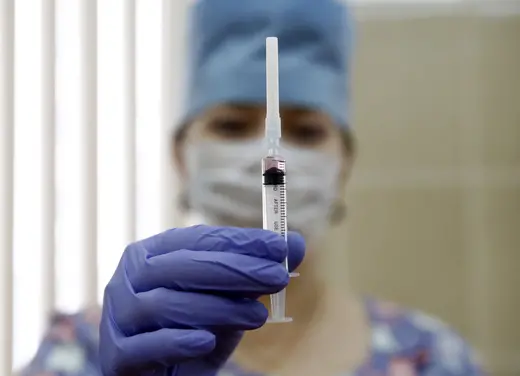In Brief
Measles and the Threat of the Anti-vaccination Movement
Measles cases have spiked as a growing number of anti-vaxxers, opting out of immunizations for their kids, threaten decades of progress toward eliminating the disease.
Measles outbreaks in many parts of the world are spooking public health authorities and highlighting the dangers of the anti-vaccination movement. The World Health Organization (WHO) listed vaccine hesitancy as a top threat in 2019, and several countries are taking action to tighten immunization laws.
Outbreaks Around the World
The number of measles cases around the globe has jumped 30 percent [PDF] since 2016, with resurgences extending from parts of North America to Southeast Asia. Most vulnerable to the highly contagious disease are young children, as well as adults with weakened immune systems, such as HIV/AIDS patients. Measles typically causes rash and fever, and in extreme cases it can lead to blindness, brain swelling, or even death.
More on:
Americas. Eight U.S. states have suffered major outbreaks in recent years, including New York, with more than 275 cases in 2019, and Washington, with more than seventy. In crisis-stricken Venezuela, an outbreak has neighboring countries scrambling to contain the disease.
Europe. Cases are at their highest level in twenty years, with France, Germany, Italy, and the United Kingdom all reporting widespread outbreaks. Cases in Ukraine, where the vaccination rate has plummeted to one the lowest in the world, fueled a 2018 spike for the region.
Asia. A mass immunization campaign in Pakistan sought to end a 2018 outbreak, when the number of cases skyrocketed to over thirty thousand. In early 2019, health officials in the Philippines declared an outbreak in Manila spurred by panic about the safety of a dengue fever vaccine; by late February, the outbreak had spread to several other parts of the country and killed more than two hundred people.
Africa. Madagascar is in the midst of one of its worst measles outbreaks in decades, as weak health infrastructure and the vaccine’s relatively high cost is putting vaccination out of reach for many.
A Dangerous Tide of Vaccine Skepticism
The spike in cases comes amid growing movements in several regions against certain vaccinations, as some parents fear harmful side effects. However, there is no debate within the medical community over the safety of vaccinations, which are rigorously tested and continuously monitored for adverse effects. “The benefits of vaccination greatly outweigh the risks, and many more illness and deaths would occur without vaccines,” says the WHO.
More on:
Several recent scholarly reviews have debunked a 1998 study that linked the vaccine for measles, mumps, and rubella to autism. Nonetheless, this study and other works by its discredited author, Andrew Wakefield, continue to dissuade families from getting their children vaccinated; for some already skeptical of vaccines, such work offers confirmation. Some antiestablishment politicians, such as Italy’s Beppe Grillo and France’s Marine Le Pen, have helped pushed the anti-vaccination narrative. U.S. President Donald J. Trump has also joined this chorus at times.
Against this backdrop, there is a heated discussion about whether governments should mandate childhood immunizations. All U.S. states require students to get certain vaccines, but many allow parents to opt their kids out for religious or philosophical reasons. Lawmakers in several states, including Minnesota and Washington, have recently introduced measures that would make it harder for families to refuse vaccinations.
Europe is having the same debate. In the past two years, countries including France, Germany, and Italy have tightened rules on childhood vaccines. The populist-led government in Italy vowed to overturn expanded vaccination requirements but reversed course after a surge in cases.
Global Progress at Risk
The anti-vaccination movement threatens to undo years of progress made against a range of preventable diseases. Mass immunization campaigns helped slash the number of measles deaths worldwide by 80 percent between 2000 and 2017, but that headway may now be stalling. Today, only 85 percent of the world’s infants receive the first dose of the treatment, and even fewer get the second dose. This is well short of the 95 percent vaccination rate that the WHO says is needed to prevent outbreaks.
If the anti-vaccination movement continues to gain momentum, there could be more outbreaks in places such as the United States, where measles has been considered eliminated for nearly two decades. With more cases, there will be greater potential for measles to spread across borders.
Until governments turn the tide of the anti-vaccination movement, health workers will face the dual challenge of containing measles in both countries where the disease is still endemic and those where it was thought long gone.
 Online Store
Online Store

